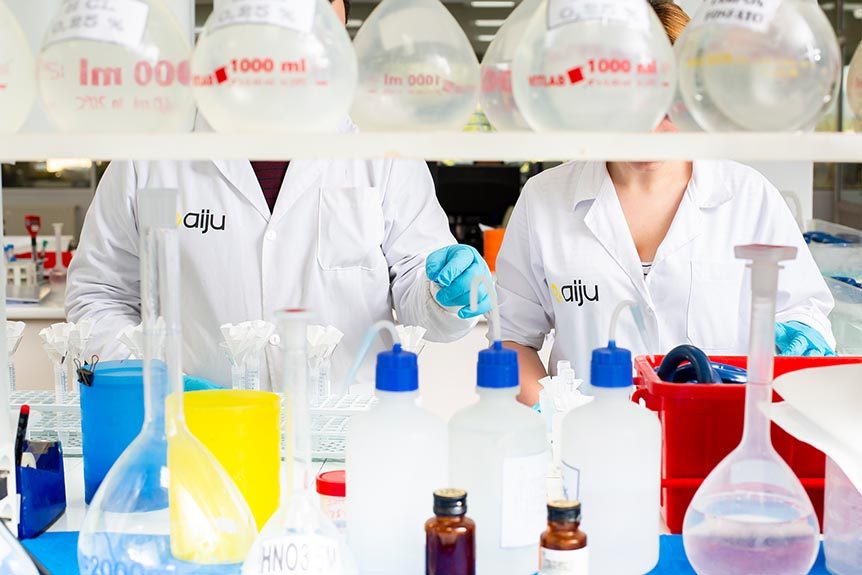Tests of consumer products
Over the course of our 30 years of experience in children’s products we have diversified our skills and knowledge in order to cover the safety of consumer products in general. Consumer protection is the paramount consideration when evaluating the possible risks entailed by using any given product.
Performing both physical-mechanical and chemical tests on these products helps to assess and control these risks, so a product can be rolled out that is suitable for use by the end consumer.

Services we perform on consumer products
Promotional articles are consumer products given as a gift, whose purpose is to advertise a brand and/or boost sales. The nature of these products is very diverse, and the safety requirements they need to comply with depend both on the nature of the article and on its use, the end consumer, the country of sale, etc.
We can help you establish what these requirements are, and perform the necessary tests to verify your products’ compliance, whether physical-mechanical, chemical, flammability or electrical.
Ensuring your product is safe before placing it on the market goes a long way to guaranteeing its success.
Textile and clothing products, and also textile and leather accessories, both for adults and for children, are subject to strict legislation regarding their chemical safety.
With us you can verify the chemical safety of your products by performing the appropriate tests. Among others, we perform the analytic determination of:
- Azo dyes, in textiles and leather.
- Heavy metals.
- Formaldehyde.
- Determination of organotin compounds.
The safety of consumer products entails monitoring multiple aspects, and perhaps one of the most difficult ones is compliance with chemical requirements.
Often, after gathering all the information relative to the raw materials used to manufacture the product, their review and study, the only option to verify the compliance of the product with the regulations is to perform analytic tests.
We have the latest analytic techniques to perform the tests that are most appropriate to the needs of your product.
Get in touch with us and we will suggest the test plan that best suits your needs.
- Technical capabilities:
- Chromatographic analysis:
- GC-FID
- GC-MS
- LCMS/Q-TOF
- HPLC-DAD, fluorescence
- UPLC-DAD, fluorescence
- Spectrophotometric analysis
- ICP-OES
- ICP-MS
- HPLC-ICP-MS
- Gravimetric analysis
- Spectroscopic analysis
- EDFRX
- UV-VIS
- Tests:
- Organic compounds:
- Additives: phthalates, preservatives, antioxidants, etc.
- Non-intentionally added substances: Amines, PAHs, etc.
- Volatile substances: Benzene, Toluene, etc.
- Azo dyes.
- Organotin compounds
- Formaldehyde
- Bisphenol A
- Other substances restricted by the REACH regulation and the RoHS Directive
- Elements:
- Heavy metals
- Elemental content and migration
- Chromium (VI) analysis
- Overall and specific migration analysis
- Analysis of Pb, Cd, Cr, Hg according to Directive 94/62/EC (packaging)
- Others
There are all manner of household items; we provide you with a team of highly qualified people and the latest analytical technologies to verify both the safety and quality aspects of these products.
Among these tests, you may wish to consider the following:
– Physical-mechanical tests.
– Flammability tests.
– Chemical tests.
– Tests on electrical or electronic devices.
– Tests on candles.
– Advice and labelling in relation to Regulation (EC) No. 1272/2008 CLP.
– Tests on food contact materials.
– Tests on packaging.
Costume jewellery and accessories are usually part of consumer products, and they can be made up of many different elements: plastic, metal, textile, etc.
To verify their safety and quality, in line with the final product, it may be necessary to carry out certain analytical tests. We offer you the necessary guidance and information regarding regulatory requirements and the applicable tests. These tests can include:
– Physical-mechanical tests.
– Flammability tests.
– Determination tests for the migration or content of metals
– Determination tests for organic compounds:
- Additives: phthalates, preservatives, antioxidants, etc.
- Non-intentionally added substances: Amines, PAHs, etc.
- Volatile substances: Benzene, Toluene, etc.
- Azo dyes.
- Organotin compounds
- Formaldehyde
- Bisphenol A
- Other substances restricted by the REACH regulation
– Safety tests on electric toys in accordance with European regulation EN62115 and international regulation IEC62115.
– Marking of electrical and electronic devices in accordance with directive 2012/19/EU on waste electrical and electronic equipment (WEEE).
– Determination of restricted substances in accordance with the RoHS Directive.
Placing candles on the market which comply with the regulations minimizes the risk of fire and of the ingestion by the consumer of toxic products originating in combustion.
We offer the possibility of verifying compliance with the following regulations for candles intended for indoor use:
- EN 15426 “Candles. Specification for Sooting Behaviour”
Requirements and methods to measure the behaviour of soot released by candles.
- EN 15493 “Candles. Specification for Fire Safety”
Requirements and test methods for the fire safety of candles intended to be lit indoors.
- EN 15494 “Candles. Safety Labels”
The risk posed by a candle due to inappropriate use can be minimised by appropriate warnings. These warnings must be easily understandable in a non-verbal way.
Directive 87/357/EC regulates products which, appearing to be other than they are, endanger the safety or health of consumers. Products which may be mistaken for food products, without being edible.
Do you have any doubts as to whether your product might be mistaken for a food product?
We perform the appropriate analysis to verify if it could or could not be considered a product with a misleading appearance.
Regulation (EC) No. 1272/2008 on classification, labelling and packaging of chemical substances, commonly known as CLP, regulates how and when these dangerous substances and mixtures must be classified within the European market.
If your product is a substance or a mixture, before it can be marketed in the European market you must assess its possible hazard classification, and label and pack it accordingly.
Through the study of the safety data sheets and other appropriate information, we can offer you the revision of the classification and labelling of chemical substances and mixtures, in accordance with the requirements of this regulation.
The REACH Regulation is the most important European Regulation governing the use of chemical substances in consumer products. It sets out obligations both for the manufacturer of the substance and the user thereof, with the ambitious objective of not allowing products to be placed on the market that contain substances whose use has not been authorised.
This Regulation is especially important for manufacturers of consumer products such as toys, childcare articles, school materials, promotional articles, costume jewellery, etc. To verify compliance with REACH obligations, it is essential that manufacturers manage the appropriate and necessary documentation. We help you with that management through the following activities:
- Establishing validity and acceptation criteria for the documentation provided by suppliers.
- Establishing supplier evaluation criteria and actions to be followed.
- Review of company documentation for the exchange and compilation of supplier information.
The definition of critical tests is a procedure consisting in the performance of partial tests of specific regulations or legislative requirements, applied at the express request of the client. This procedure helps the manufacturer to control the safety of the product during the different phases of its production.
The definition of critical tests can be done in many ways:
- Critical tests may be defined and selected directly by the requester of the test.
- Critical tests may be selected at the discretion of our laboratory’s technical staff, taking into account the most representative or controversial safety aspects in each product category. The tests will be determined after we have received the product that is to be studied, and after it has been inspected in our laboratory.
- If the products have been previously tested at our laboratory, critical tests are selected by our technical staff considering the non-conformities, and/or the weak points obtained in previous tests.
Regulation (EC) No. 1223/2009 on cosmetic products establishes requirements on the labelling and composition of said products.
Providing consumers with the appropriate information indicated in the regulations is vital for the quality of the product, and to avoid possible fines and the withdrawal of the product.
We perform the revision of this information and of the composition of the cosmetic product to verify its compliance with the regulation and to increase its value.
Consumer products must be accompanied by the appropriate information that helps the consumer to identify the product and its manufacturer. It must also contain additional information about the necessary warnings for its safe use, as well as instructions for its use, cleaning, maintenance, assembly, etc. The type of information that should be indicated on the product itself, on the packaging or in the instructions will depend on the type of product (children’s product, toy, school materials, promotional articles, textiles, etc).
At our laboratory we can provide our expert opinion and/or the revision of the information of the labelling and instructions that your product may need. This opinion and revision is performed in accordance with the specific applicable safety regulation, if any, or with general applicable legislation.
Sometimes it can be difficult to put a product in a specific category. Is it a toy? Is it a children’s product?
In such cases, performing a technical assessment such as a study or research into the technical aspects that should be taken into consideration for its classification may be the solution for cataloguing the product, knowing the applicable legislation and regulations, its labelling, etc.
These assessments can apply to any product in order to classify it and to dispel any doubts as to whether it is a toy, a childcare article, a children’s product, or a product in any other category.
It is possible to perform complete technical assessments from the product conception, or it may be more appropriate to perform technical assessments of specific points:
- Legislative and regulatory diagnosis.
- Diagnosis of the application of specific sections or points of the regulations and the legislation.
- Diagnosis of the age grading in accordance with technical regulations.
- Diagnosis of the classification of the type of product (Grey area).
- Study of products which appear to be other than they are.
- Review of test reports.
- Technical clarification of reports or the ruling of authorities.
Plastic materials can be considered the most important raw material for consumer products. Their identification and classification is fundamental as a quality and safety aspect of your product. To find out more about our services insofar as this topic is concerned, please click on the following link:


- Testing is one of the most effective ways to assess and verify the safety of consumer products. We offer you the necessary guidance and collaboration to perform such tests, in order to put on the market a product that meets the highest demands of safety and quality.
- Assessing the safety of the product before placing it on the market is vital to protect the consumer and to avoid non-compliances and product recall, with the possible ensuing fines and associated costs.
- The accreditation of our test methods by ENAC guarantees the recognition of our test reports at the international level.
How we perform tests on consumer products
Most of the tests performed at AIJU have ENAC accreditation, which facilitates the recognition of our test reports within Europe.
We work in direct contact with our clients, to ensure that the proposed analysis completely cover all your needs.
We have a laboratory equipped with the most sophisticated techniques of sample preparation and analysis, which allows us to cover a wide range of chemical determinations for all sorts of consumer products.
When you reach out to AIJU to verify your products you will immediately receive the advice of our group of experts in regulations and legislation. This team will inform you about the applicable requirements, the necessary information or documents and how best to approach the appropriate tests.
Confidence in our consumer product tests
The technical staff that performs the tests is highly qualified, and the ongoing training of the team, as well as their constant updating in legislative matters, generates the necessary confidence in our clients.
Apart from our human team, our laboratory has the most modern analysis techniques which allow for more selective determinations and concentration limits in line with legislative requirements.
In AIJU’s laboratory we have our own line of research designed to improve the safety of consumer products and dedicated to the development of test methods that allow manufacturers to verify their products.
